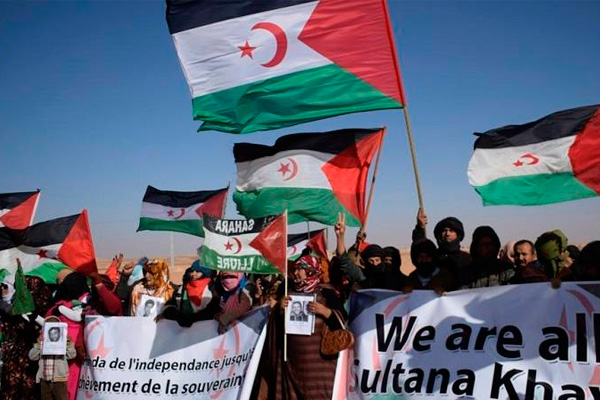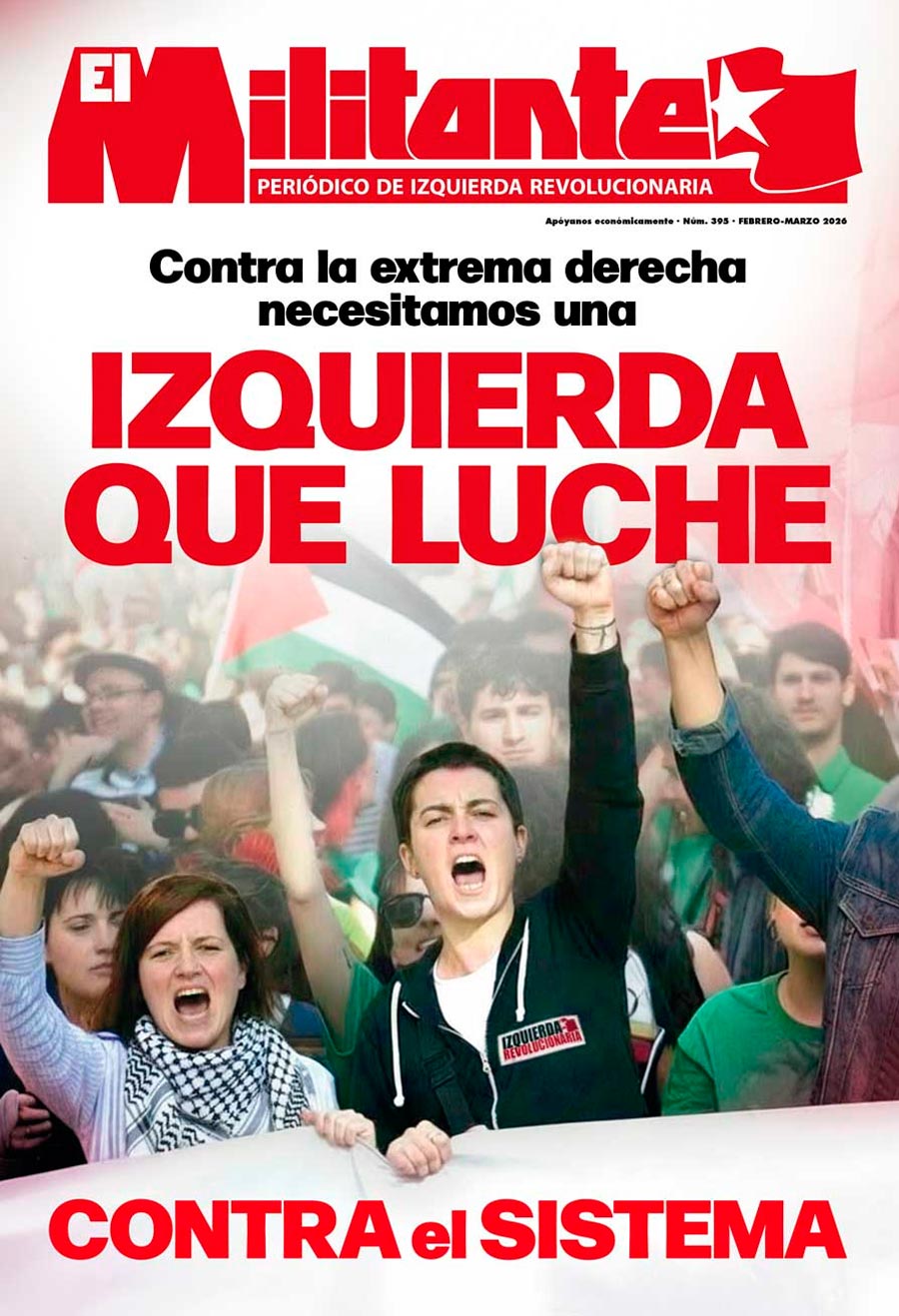President of the Government Pedro Sánchez has told the King of Morocco, Mohamed VI, that the proposal of an autonomy regime for the Sahara made in 2007 by the Moroccan Executive is “the most serious, realistic, and credible” alternative for solving the conflict.
He did so secretly, in a letter sent to the Alawite monarch, which we are only aware because the Moroccan Royal House made it public on the 18th of March.
With this position, Pedro Sánchez and the PSOE unequivocally place themselves on the side of the brutal Moroccan dictatorship that oppresses the masses while crushing the rights of the Saharawi people and stealing the natural resources that belong to them.
All the talk about “democracy” and “the right to self-determination” that we hear regarding Ukraine from the Spanish Government and Western imperialism becomes a dead letter concerning the Saharawi people.
This new position of Pedro Sánchez has provoked the angry response of the investiture partner parties of the coalition Executive, including Unidas Podemos (UP). The purple formation “formally” rejects the capitulation of Sánchez to Morocco and continues to demand a referendum for the Sahara. On Tuesday, March 22, deputies from different parties, UP among them, unfurled Saharawi flags in Congress and defended the holding of the self-determination referendum.
But at the same time, Ione Belarra, Yolanda Díaz, and other UP leaders assured that this “disagreement” does not imply that UP has any intention of leaving the Executive and breaking with its subordination to the NATO. They also reiterated that “commitment to the coalition government is more important than ever.”
Once again, the Government of Sánchez fails to fulfill a public commitment, this time betraying the legitimate aspirations of the Saharawi people. And once again, UP, after pitifully protesting, ends up obediently bowing to the policy set by PSOE. But one cannot speak for the Saharawi people and at the same time be part of a government that legitimizes its oppression by the Moroccan dictatorship. Enough of cynicism!
The Saharawi people, one more pawn on the board of world geopolitics
For decades the “democratic” governments of the PSOE and the PP (which now, along with Vox and Ciudadanos, demagogically criticizes Pedro Sánchez about his new position in the Sahara conflict have actively supported the policy of the Alawite dictatorship, remaining silent on the atrocities committed in the Sahara and in Morocco itself.
This policy has continued under the PSOE-UP government. The latter, which defended in its program the establishment of diplomatic relations with the Saharawi Arab Democratic Republic (SADR) and the right of self-determination for its people, made it clear from the outset what its role was going to be concerning this issue within the Executive.
In November 2020, the “socialist” Foreign Minister Arancha González Laya reiterated to her Moroccan counterpart that the government did not recognize the SADR. Pablo Iglesias was then forceful: "As could not be otherwise, the Ministry of Foreign Affairs determines the position of Spain on Western Sahara."
By defending the Moroccan regime, the different Spanish governments have been guaranteeing the interests and investments of the Spanish multinationals in Morocco and the access of the large fishing companies to the fishing grounds controlled by this country. To this was added, in recent decades, the factor of migratory control. The government of Spain, as a faithful guardian of the racist policy of the European Union on its southern border, subcontracts repressive services to the Moroccan authorities, ignoring the brutal treatment suffered by migrants who try to access Europe.
Linked to all these elements is the position of Morocco in the fierce fight waged by the great imperialist powers to control areas of influence, markets, sources of raw materials, etc. In recent years, with the bitter struggle between the US and China for world supremacy, the importance of this factor has increased.
The presence and influence of China and Russia on the African continent have grown significantly, displacing France and the US from areas that had traditionally been under their control. In this context of weakness, US imperialism maneuvers to maintain its positions and considers it necessary to strengthen its ties with Morocco, a country also being courted by the Asian giant.
On December 10, 2020, then President Donald Trump recognized the sovereignty of Morocco over Western Sahara. This decision remains fully valid with the Joe Biden administration. Since then, the pressure for European countries to definitively agree fand defend the pretensions of the Moroccan regime has increased drastically.
Morocco has also played its cards. The Alawite regime, driven by the support of the American Government, has used its position as the gendarme of the southern border of the EU and its domination over the rich fishing grounds of Western Sahara to demand that European countries officially recognize Moroccan sovereignty over the Sahrawi territory. On December 11, 2020, the Government of France declared the autonomy plan proposed by Morocco as “a serious and credible basis for discussion” on which to work. A year later, on December 14, 2021, the German Social Democratic majority government, through its Minister of Foreign Affairs, Annalena Baerbock, from the Greens, also defended this autonomy plan for Western Sahara.
Now it is the Government of Spain, faithful squire of US imperialism, which joins these theses and reinforces the betrayal of the Saharawi people. This servility towards the US threatens to provoke a diplomatic conflict between the Spanish State and Algeria, the leading supplier of hydrocarbons to the Iberian Peninsula, an ally of the Polisario Front, the historical rival of Morocco for the hegemony of the Maghreb, and a trading partner of China. Algeria has recalled its ambassador in Madrid for consultations and has stated that it will give “a global response to the new position of Madrid regarding the Sahara.”
For her part, Nabila Massrali, spokesperson for Foreign Affairs of the Executive Commission, has made public the support of the EU to the new Spanish position.
The “international legality” and the hypocrisy of the capitalist powers
Faced with the Russian invasion of Ukraine, the USA, Germany, France, the Spanish State, and all the EU Member States present themselves to world public opinion as great defenders of international legality, the freedom of people, and the territorial integrity of the countries.
But when it comes to the situation in Western Sahara and the suffering that the Saharawi people have been enduring for decades, their concern about compliance with international law completely disappears.
UN resolution 690 of April 29, 1991, recognizes the right of the Sahrawi people to self-determination. It includes a plan establishing a transitional period in which the people of Western Sahara would have to choose between independence or integration into Morocco. But the reality is that this referendum has never taken place.
On the other hand, the General Court of the European Union determined again in September 2021 (it had already done so in 2016 and 2018) that Western Sahara and Morocco are two distinct and separate territories. The European Court stressed that Morocco does not have sovereignty over Western Sahara, that it is a simple occupying power, so therefore, its presence in the territory is illegal.
But what does international legality or the rights of peoples matter when it comes to preserving and defending the interests of US imperialism and its subordinate partners in the EU? Their hypocrisy knows no bounds.
Should the resolutions of the UN or the judgments of the international tribunals not be in line with the objectives pursued by the great powers, they are ignored and thrown into the dustbin without consideration.
45 years of war and repression
The roots of the Saharawi national question lie in the scandalous process of decolonization carried out by the Spanish State during the decomposition of the Franco regime. In this context, there was a confluence of interests between the monarchy of Hassan II -aiming to exploit the wealth of the Sahara coast and its phosphate deposits, as well as at stirring up chauvinism by diverting the attention of the Moroccan masses from their most pressing problems; US imperialism -aspiring to strengthen the Moroccan regime as a firm ally; and the heirs of the Franco regime plotting the coronation of Juan Carlos I and seeking the US backing for this operation.
After the famous “Green March” organized by the Moroccan dictatorship with the sponsorship of the US, the current king emeritus (Juan Carlos I) and Hassan II secretly agreed that the Spanish State would cede the Sahara to Morocco in exchange for American support to the future king. They also reached a series of economic treaties, reflected in the secret annexes to the Madrid Tripartite Agreement of November 1975, which sealed the power transfer of the colony.
The Moroccan invasion that same year unleashed a war that lasted until 1991. The occupation of the Saharawi territory was brutal, including white phosphorous and napalm bombardments against civilians. There was a massive flight of population. About two-thirds of the inhabitants went into exile. Many ended up in the refugee camps of Tindouf, Algeria, where nearly 175,000 refugees live in precarious conditions.
The war divided Western Sahara into two: the coastal part occupied by Morocco, where the phosphate deposits concentrate, and the eastern border strip with Algeria and Mauritania, known as the Liberated Territories, and from where the Polisario Front wages the battle. In 1980 Morocco began the construction of the wall of shame to separate the two parts.
For the right of self-determination of the Saharawi people
For years, the only thing that has managed to put the Moroccan monarchy on the ropes has been mass struggle, while the UN plans have solved absolutely nothing.
The oppressed people of the Sahara and Morocco have staged numerous mobilizations in recent decades. In 2005 the so-called Saharawi Intifada took place. In June 2008, there was a general strike in Morocco. In 2010, more than 20.000 people took part in the protests during the Gdim Izik camp uprising, and Morocco joined the revolutionary wave of the Arab Spring, giving birth to the February 20 Movement a few months later. In October 2016, the Hirak (Popular Movement) broke out in the Rif, becoming the most relevant social upheaval since 2011.
All these events show that the key lies in uniting the forces of the Saharawi people, who have every right to legitimate armed self-defense, with that of the Moroccan workers and peasants to fight together against the same authoritarian and corrupt regime that condemns them to an existence of misery. The Polisario Front must draw all the lessons from the betrayal of the Sánchez government, the EU, and the US and rely on the program of the socialist revolution to win recognition of the national rights of the Sahrawi people.
Only by breaking with capitalism and imperialist oppression will Saharawi people break free.





















































